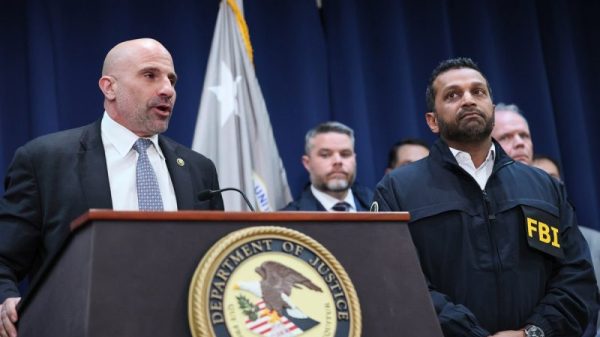BERLIN, N.H. — Nikki Haley had talked about a litany of issues America is confronting today — including fentanyl, inflation and wars abroad — before an audience member at a town hall here Wednesday raised his hand to question the Republican presidential candidate about a 162-year-old event.
“What was the cause of the United States Civil War?” the man asked Haley, a former U.N. ambassador and South Carolina governor who is campaigning this week in this key early primary state.
Haley’s answer did not include any mention of slavery, which scholars agree was the main driver of the conflict. It prompted surprise from her questioner and swift criticism and rebuttals from Democrats and Republicans beyond New Hampshire, including President Biden. It also resurfaced Haley’s previous comments that the war was the result of disagreements over “tradition versus change.”
At first, when she heard the question, Haley appeared caught off guard. The recreation room in this northernmost city in New Hampshire, a place that has leaned red in recent elections, grew quiet, and Haley looked at the man dressed in a plaid shirt who stood behind his sons seated in the back row.
She paused and responded, “Well, don’t come with an easy question.” Then she proceeded to answer.
“I think the cause of the Civil War was basically how government was going to run, the freedoms and what people could and couldn’t do,” Haley said.
She then turned the question to the man who asked it: “What do you think the cause of the Civil War was?”
The man responded that he is not running for president and wanted to hear her thoughts.
“I think it always comes down to the role of government and what the rights of the people are,” Haley continued. “And I will always stand by the fact that I think government was intended to secure the rights and freedoms of the people. It was never meant to be all things to all people. Government doesn’t need to tell you how to live your life. They don’t need to tell you what you can and can’t do. They don’t need to be a part of your life.”
The man then responded, “In the year 2023, it’s astonishing to me that you answer that question without mentioning the word slavery.”
Haley quickly replied with a question: “What do you want me to say about slavery?”
The man said, “You’ve answered my question, thank you.” Haley replied, “Next question.”
The voter declined to share his name when asked by The Washington Post. He later told reporters that he had asked the question because he saw her answer such a question when she was running for governor of South Carolina and he was curious if she would provide the same response in New Hampshire.
When Haley ran for governor of South Carolina in 2010, she addressed the Civil War during a private meeting with two leaders of Confederate heritage groups. She called it a fight between “tradition” and “change.”
“You see passions on different sides,” she said at the time. during comments that were captured on video and previously reported by The Washington Post. “I don’t think anyone does anything out of hate.”
The man who asked the question said he thought her reply reflected her previous comments and he wasn’t surprised by it. He declined to share his party affiliation or any information about his political beliefs. He added that he thought she was an accomplished and smart woman and her staff was respectful.
Scholars agree that a dispute over slavery was central to causing the Civil War, said James Grossman, the executive director of the American Historical Association. He added that while Haley’s answer reflects the seceding Southern states’ argument that their rights were infringed, she leaves out that the states wanted to protect the institution of slavery. He also said it was inaccurate to say the government was infringing on everyone’s rights rather than some enslavers’ so-called freedom.
“The problem is that the quote-unquote rights to which she’s referring are the rights of some people to own other humans,” he said.
Biden took to social media Wednesday night to call attention to Haley’s exchange. “It was about slavery,” he wrote on X, formerly Twitter.
After the event, some attendees told The Post that they thought Haley answered the question to the best of her ability and they accused the man who asked the question of intending to cause trouble.
One audience member heckled the man when he said he wasn’t running for president, saying that was a good thing.
Trump dominated here in this northern county in the last contested Republican primary in 2016 and holds a wide lead in polls of the GOP race in New Hampshire, with Haley gaining ground on him in a distant second. Several attendees said they were considering Trump or Haley in next month’s primary.
Vickie Plourde, who said she was undecided before the event, said she had been persuaded to vote for Haley after the town hall. She said the question was a setup. “We have to move past that,” she said of slavery. “If we continue to look in the past and say ‘Look, look, look, look,’ and we’re not moving forward, we’re going to stay back there.”
Race has historically been a delicate issue for Haley. After a white supremacist killed nine people attending Bible study at a historically Black church in Charleston in 2015, Haley signed legislation removing the Confederate flag from the State House grounds. In 2010, she suggested that she would not make such a move and was well-equipped to challenge an NAACP-boycott of the state over the flag because of her status as a woman of color.
“I don’t have any intentions of bringing it back up or making it an issue,” she told the leaders of the Confederate heritage groups. “I’m the perfect person to deal with the boycott because as a minority female, I’m going to talk to them and I’m going to go and let them know that every state has different conditions and every state has certain things that they hold as part of their heritage.”
Democratic National Committee Chairman Jaime Harrison referenced some of those comments as he criticized Haley’s remarks Wednesday night.
“Same person who said the confederate flag was about tradition & heritage and as a minority woman she was the right person to defend keeping it on state house grounds,” he wrote on X. “Some may have forgotten but I haven’t. Time to take off the rose colored Nikki Haley glasses folks.”
The presidential campaign of Florida Gov. Ron DeSantis, which has been trading attacks with Haley, amplified her comments on Wednesday evening, sharing video on X and calling her omission of slavery inexplicable.
DeSantis and his allies have been attacking Haley mostly from the right, charging that she is insufficiently conservative. But they have also criticized her as inconsistent, and some allies of the governor have predicted that growing scrutiny of Haley would hurt her with moderate voters as well as the party’s base.
DeSantis has also faced blowback to his approach to race and the history of slavery and discrimination in the United States. His administration barred an Advanced Placement African American studies course, objecting to some of its content, and was widely criticized for slavery education standards that called for instruction on “how slaves developed skills which, in some instances, could be applied for their personal benefit.” DeSantis defended the moves and said they were misconstrued.
Hannah Knowles contributed to this report.
BERLIN, N.H. — Nikki Haley had talked about a litany of issues America is confronting today — including fentanyl, inflation and wars abroad — before an audience member at a town hall here Wednesday raised his hand to question the Republican presidential candidate about a 162-year-old event.
“What was the cause of the United States Civil War?” the man asked Haley, a former U.N. ambassador and South Carolina governor who is campaigning this week in this key early primary state.
Haley’s answer did not include any mention of slavery, which scholars agree was the main driver of the conflict. It prompted surprise from her questioner and swift criticism and rebuttals from Democrats and Republicans beyond New Hampshire, including President Biden. It also resurfaced Haley’s previous comments that the war was the result of disagreements over “tradition versus change.”
At first, when she heard the question, Haley appeared caught off guard. The recreation room in this northernmost city in New Hampshire, a place that has leaned red in recent elections, grew quiet, and Haley looked at the man dressed in a plaid shirt who stood behind his sons seated in the back row.
She paused and responded, “Well, don’t come with an easy question.” Then she proceeded to answer.
“I think the cause of the Civil War was basically how government was going to run, the freedoms and what people could and couldn’t do,” Haley said.
She then turned the question to the man who asked it: “What do you think the cause of the Civil War was?”
The man responded that he is not running for president and wanted to hear her thoughts.
“I think it always comes down to the role of government and what the rights of the people are,” Haley continued. “And I will always stand by the fact that I think government was intended to secure the rights and freedoms of the people. It was never meant to be all things to all people. Government doesn’t need to tell you how to live your life. They don’t need to tell you what you can and can’t do. They don’t need to be a part of your life.”
The man then responded, “In the year 2023, it’s astonishing to me that you answer that question without mentioning the word slavery.”
Haley quickly replied with a question: “What do you want me to say about slavery?”
The man said, “You’ve answered my question, thank you.” Haley replied, “Next question.”
The voter declined to share his name when asked by The Washington Post. He later told reporters that he had asked the question because he saw her answer such a question when she was running for governor of South Carolina and he was curious if she would provide the same response in New Hampshire.
When Haley ran for governor of South Carolina in 2010, she addressed the Civil War during a private meeting with two leaders of Confederate heritage groups. She called it a fight between “tradition” and “change.”
“You see passions on different sides,” she said at the time. during comments that were captured on video and previously reported by The Washington Post. “I don’t think anyone does anything out of hate.”
The man who asked the question said he thought her reply reflected her previous comments and he wasn’t surprised by it. He declined to share his party affiliation or any information about his political beliefs. He added that he thought she was an accomplished and smart woman and her staff was respectful.
Scholars agree that a dispute over slavery was central to causing the Civil War, said James Grossman, the executive director of the American Historical Association. He added that while Haley’s answer reflects the seceding Southern states’ argument that their rights were infringed, she leaves out that the states wanted to protect the institution of slavery. He also said it was inaccurate to say the government was infringing on everyone’s rights rather than some enslavers’ so-called freedom.
“The problem is that the quote-unquote rights to which she’s referring are the rights of some people to own other humans,” he said.
Biden took to social media Wednesday night to call attention to Haley’s exchange. “It was about slavery,” he wrote on X, formerly Twitter.
After the event, some attendees told The Post that they thought Haley answered the question to the best of her ability and they accused the man who asked the question of intending to cause trouble.
One audience member heckled the man when he said he wasn’t running for president, saying that was a good thing.
Trump dominated here in this northern county in the last contested Republican primary in 2016 and holds a wide lead in polls of the GOP race in New Hampshire, with Haley gaining ground on him in a distant second. Several attendees said they were considering Trump or Haley in next month’s primary.
Vickie Plourde, who said she was undecided before the event, said she had been persuaded to vote for Haley after the town hall. She said the question was a setup. “We have to move past that,” she said of slavery. “If we continue to look in the past and say ‘Look, look, look, look,’ and we’re not moving forward, we’re going to stay back there.”
Race has historically been a delicate issue for Haley. After a white supremacist killed nine people attending Bible study at a historically Black church in Charleston in 2015, Haley signed legislation removing the Confederate flag from the State House grounds. In 2010, she suggested that she would not make such a move and was well-equipped to challenge an NAACP-boycott of the state over the flag because of her status as a woman of color.
“I don’t have any intentions of bringing it back up or making it an issue,” she told the leaders of the Confederate heritage groups. “I’m the perfect person to deal with the boycott because as a minority female, I’m going to talk to them and I’m going to go and let them know that every state has different conditions and every state has certain things that they hold as part of their heritage.”
Democratic National Committee Chairman Jaime Harrison referenced some of those comments as he criticized Haley’s remarks Wednesday night.
“Same person who said the confederate flag was about tradition & heritage and as a minority woman she was the right person to defend keeping it on state house grounds,” he wrote on X. “Some may have forgotten but I haven’t. Time to take off the rose colored Nikki Haley glasses folks.”
The presidential campaign of Florida Gov. Ron DeSantis, which has been trading attacks with Haley, amplified her comments on Wednesday evening, sharing video on X and calling her omission of slavery inexplicable.
DeSantis and his allies have been attacking Haley mostly from the right, charging that she is insufficiently conservative. But they have also criticized her as inconsistent, and some allies of the governor have predicted that growing scrutiny of Haley would hurt her with moderate voters as well as the party’s base.
DeSantis has also faced blowback to his approach to race and the history of slavery and discrimination in the United States. His administration barred an Advanced Placement African American studies course, objecting to some of its content, and was widely criticized for slavery education standards that called for instruction on “how slaves developed skills which, in some instances, could be applied for their personal benefit.” DeSantis defended the moves and said they were misconstrued.
Hannah Knowles contributed to this report.





















